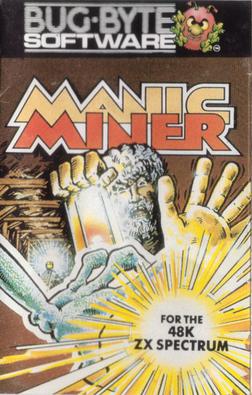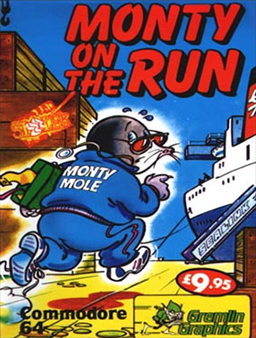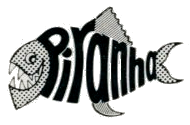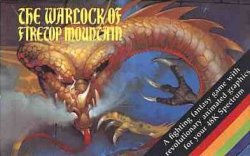
Manic Miner is a platform game written for the ZX Spectrum by Matthew Smith. It was published by Bug-Byte in 1983, then later the same year by Software Projects. The first game in the Miner Willy series, the design was inspired by Miner 2049er (1982) for the Atari 8-bit computers. Retro Gamer called Manic Miner one of the most influential platform games of all time, and it has been ported to numerous home computers, video game consoles, and mobile phones.

Sabre Wulf is an action-adventure game released by British video game developer Ultimate Play the Game for the ZX Spectrum home computer in 1984. The player navigates the pith-helmeted Sabreman through a 2D jungle maze while collecting amulet pieces to bypass the guardian at its exit. The player does not receive explicit guidance on how to play and is left to decipher the game's objectives through trial and error. Sabreman moves between the maze's 256 connected screens by touching the border where one screen ends and another begins. Each screen is filled with colourful flora, enemies that spawn at random, and occasional collectibles.

Alien 8 is an action-adventure video game developed and published by Ultimate Play the Game. It was released for the ZX Spectrum, BBC Micro, Amstrad CPC and MSX in 1985. The game is a spiritual successor to the best-selling Knight Lore, which was lauded by critics for its isometric graphics. In the game, the player takes control of a robot, Alien 8, whose job is to ensure that all of the cryogenically frozen passengers on board a starship remain viable during the ship's voyage.

Tranz Am is an action video game developed and published by Ultimate Play the Game that was released for the ZX Spectrum in July 1983. The game is set in a post-apocalyptic version of the United States and centres around a racing car driver on his quest to obtain the Eight Great Cups of Ultimate, which are scattered throughout the country.
Telecomsoft was a British video game publisher and a division of British Telecom. The company was founded by Ederyn Williams in 1984 and operated three separate labels: Firebird, Rainbird, and Silverbird. The first employee was James Leavey, seconded from elsewhere in BT, who, along with Tony Rainbird, became the driving force behind the company in the early days.

Monty on the Run is a computer game created by the software house Gremlin Graphics and released in 1985 for the Commodore 64, ZX Spectrum, Amstrad CPC and Commodore 16, written by Peter Harrap for the ZX Spectrum with the iconic in-game music on the Commodore 64 provided by Rob Hubbard. It is the third game in the Monty Mole series.

Bomb Jack is a platform game published by Tehkan for arcades and later ported to home systems. The game was a commercial success for arcades and home computers. It was followed by several sequels: the console and computer game Mighty Bomb Jack, the arcade game Bomb Jack Twin, and Bomb Jack II which was licensed for home computers only.

Bug-Byte Software Ltd. was a video game company founded in 1980 in Liverpool, initially producing software for the Acorn Atom and ZX80. Bug-Byte's first hit was Don Priestley's Mazogs which was one of the most successful titles for the ZX81. In 1983, it published Manic Miner, considered to be one of the most influential platform games of all time. The company went into liquidation in 1985 but their name and logo were purchased by Argus Press PLC for use as a budget software label.

International Soccer, also known as International Football, is a sports video game written by Andrew Spencer for the Commodore 64 and published by Commodore International in 1983. Originally only available on cartridge, CRL re-released the game on cassette and disc in 1988.

Spindizzy is an isometric video game released for several 8-bit home computer formats in 1986 by Electric Dreams Software. It combines action and puzzle game elements. Players must navigate a series of screens to explore a landscape suspended in a three-dimensional space. Development was headed by Paul Shirley, who drew inspiration from Ultimate Play the Game games that feature an isometric projection.

Brataccas is a science fiction action-adventure game released in 1985 for the Amiga, Atari ST, and Macintosh. It was the first game published by Psygnosis. Brataccas is built on the remains of the much-hyped vaporware project Bandersnatch, which was partially developed by Imagine Software. The storied tale of the game's development led to close press attention in the UK computer market. When Brataccas finally shipped, this attention resulted in considerable coverage in the computer press. It was generally reviewed poorly due to significant control problems, although the graphics were widely praised.

Match Day is a football computer game, published by Ocean Software in 1984 for the ZX Spectrum. It is the first game in the Match Day series, and was the creation of programmer Jon Ritman and Chris Clarke. Versions were later released for the Amstrad CPC and PCW, BBC Micro, Commodore 64 and MSX systems.
Quicksilva was a British games software publisher active during the early 1980s.
Thorn EMI Computer Software was a British video games software house set up in the early 1980s as part of the now-defunct British conglomerate Thorn EMI. They released a number of games in the early 1980s, initially for the Atari 8-bit family, and later for the ZX Spectrum, Commodore 64 and VIC-20 computers. In 1984, the Thorn EMI name was dropped in favour of Creative Sparks as the company were reportedly unhappy with their image in the video games market. A budget label, Sparklers, was created in early 1985 to publish titles at £2.50. Later in 1985, Creative Sparks, Sparklers and the distribution company, Creative Sparks Distribution (CSD) gained independence from Thorn EMI after a management buyout.

Kong Strikes Back! is a 1984 platform video game published by Ocean Software in 1984 for the Amstrad CPC, Commodore 64 and ZX Spectrum. While its predecessor, Kong, is a Donkey Kong clone, Kong Strikes Back! is a clone of Mr. Do's Wild Ride with Donkey Kong-inspired graphics.

Rambo is a 1985 video game based on the film Rambo: First Blood Part II (1985). The game was designed by David Collier and Tony Pomfret with the ZX Spectrum version converted by Platinum Productions.

Bugaboo (The Flea), later published in Spain as La Pulga, is a video game written by the Spanish programming duo Paco Portalo and Paco Suarez for the ZX Spectrum and published by Quicksilva in 1983. It was later released for the Commodore 64 and MSX were produced. The Amstrad CPC port was published under the name Roland in the Caves using the Roland character.

Piranha Software was a short-lived video game publishing label created by Macmillan Publishers in 1986 and closed eighteen months later. In that time it gained a reputation for its unusual output from well known developers such as Don Priestley, Design Design and Delta 4. The majority of their games featured licensed properties including the first video game based on the Discworld novels and two games based on the animated television series The Trap Door.

The Warlock of Firetop Mountain is an action game published by Crystal Computing in 1984 for the ZX Spectrum home computer. It is loosely based on the adventure gamebook of the same name written by Steve Jackson and Ian Livingstone, and published by Puffin Books in 1982.
















